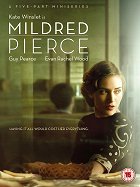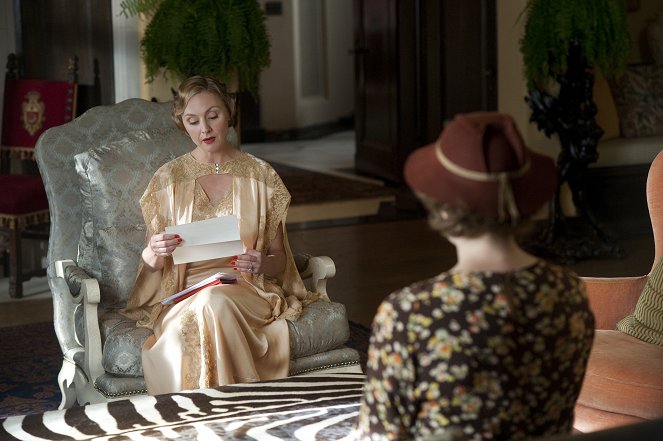Regie:
Todd HaynesKamera:
Edward LachmanMusik:
Carter BurwellBesetzung:
Kate Winslet, Brían F. O'Byrne, Melissa Leo, James Le Gros, Mare Winningham, Marin Ireland, Murphy Guyer, Guy Pearce, Evan Rachel Wood, Elvy Yost (mehr)Folgen(5)
Inhalte(1)
Divorced single mom Mildred Pierce decides to open a restaurant business, which tears at the already-strained relationship with her ambitious elder daughter, Veda. (Verleiher-Text)
Kritiken (3)
Zu den klassischen Verfilmungen von James M. Cain, der insbesondere in den 1940er Jahren sehr beliebt war, steht Solange ein Herz schlägt genau zwischen Frau ohne Gewissen und Wenn der Postmann zweimal klingelt In der Neubearbeitung von Mildred begegnen wir erneut Kate Winslet, wie schon so oft, wenn man ein Drama einer starken Frau sehen soll. Doch dieses Mal wird Kates schauspielerische Leistung von einem ausgezeichneten Drehbuch, einer perfekten Kulisse, in der es nicht schwer ist, den Unterschied zwischen mehreren Jahren durch ein einziges Detail zu erkennen, und einem wirklich perfekten Drama in den Schatten gestellt. Die Geschichte des Aufstiegs vor dem Hintergrund der Wirtschaftskrise ist großartig. Das verschlungene Vieleck inmitten einer Familie ist spektakulär. Und jede der Episoden funktioniert wie ein eigener kleiner Film. Was mehr sollte man sich wünschen? Dank der Serie erschien zum ersten Mal eine tschechische Übersetzung des Buches, und das ist nicht wenig.
()
Woman on top. Haynes’s miniseries shows what the period melodramas avoided. Physical details, the faithlessness of the capricious characters, authentic poverty. Everything is converted into money, the easiest means of achieving the success that the characters either desire or are pressured to pursue. The characters realistically talk about how much things cost, which other films from the same period wouldn’t bother with. ___ Mildred’s social position, as it is seen by society and not by the protagonist herself, is best described by the Vedic saying “we are not in any way exceptional”. The question is thus: How to become SOMEONE? How to be a lady and still maintain one’s dignity? Let oneself be supported as a companion or take a menial job? Who controls whom, who gives the orders to whom? ___ With the protagonist’s emancipation, after she begins to drive in both the literal and figurative sense and after she becomes an outwardly confident lady, the setting and the emphasis placed on existential concerns also change. Financially secure, Mildred no longer has to worry about ensuring that her daughter has enough to eat, as she newly seeks her favour. Simply stated, she paid a high price for her freedom – she got money, but she lost love. The series undergoes a transformation from socially critical drama to melodrama (and almost to ancient tragedy, which the opera arias evoke). Compared to Curtiz’s film, the crime storyline and film noir elements have been suppressed, though the ending is even more ambiguous and doesn’t come close to establishing a satisfactory status quo. The post-war crisis of male identity has been replaced with a more intractable crisis of values intrinsic to both sexes. Not only are there no women that can be relied on, but no men either. ___ The setting in the crisis-ridden 1930s is not ostentatiously shown externally. By eliminating the formalistic excesses of modern series, Mildred Pierce gives the impression that it was actually made in the depicted period (except for the colours of the intentionally slightly dull visuals). ___ The complicated role of a woman who is unable to stop loving her greatest burden and, at the same time, the only constant in her life was an opportunity for Kate Winslet. She did not disappoint. She is not afraid to go to the edge, even at the cost of ugliness and accusations of revelling too much in the protagonist’s suffering, and to show the grand emotions that are simply a part of great drama. She reveals every bit of herself, not only during the bold and believable erotic scenes, whose purpose is not only to show her nude body, as they show that Mildred doesn’t have to hide anything from Monty (at first) or wear a uniform. Winslet plays an unhappy woman who doesn’t seem relaxed even when she laughs. Momentary joy can’t drown out all of the problems around her. Not this time, not in this miniseries, which is bolder and more honest than other films and series that enable us to escape from our concerns for a few hours. Mildred Pierce, a symptom of the ongoing economic crisis, brings them directly to us. 85%
()
(weniger)
(mehr)
The first episode gives the impression that this will be a five-hour, one-woman show by Kate Winslet in a series that would have been better as a regular feature-length movie. The second and the rest of the episodes cure you of this impression, but it doesn’t cure it of the overall coldness, that doesn’t happen until episode four. It’s not just about Winslet’s acting (e.g. Morgan Turner and her brat growing into elite bitch par excellence out-acts here in all scenes together), but luckily this isn’t so much about “founding KFC" either and, thanks to the narration that jumps about strangely, you get the impression that this miniseries could have been longer in places. I haven’t read the book, but Hayne’s style for me is like a monotonous good-night story. It’s clear that there is some powerful material here, but we don’t get to see it because of the depersonalized delivery... Basically it has the identical pluses and minuses as his Far From Heaven. In a five-hour package.
()

